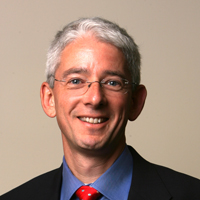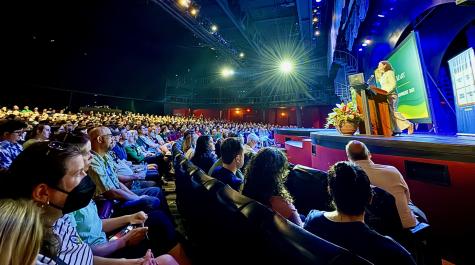W&M Professional Development Days
More than 1,400 William & Mary faculty and staff members – over 70% of employees – gathered over two days last week in the university’s first-ever all-employee event devoted to the vital skills of democratic engagement. The two-hour program drew on campus expertise in lively, moving and reflective ways. Colleagues from across the university enjoyed each other’s company while preparing for the academic year.
At a time when the nation is often described as polarized, William & Mary has committed to engaging across divides inside and outside the classroom. Since 2021, as part of the university’s Democracy Initiative, all incoming students have been trained on the Aspen Institute’s Better Arguments program. With the goal of fostering an environment where respectful dialogue can take place, on even the most challenging topics, William & Mary students and staff have adapted and expanded this co-curriculum.
This summer, program leaders invited staff and faculty into that program, as part of these inaugural Professional Development Days. The Better Arguments program gives people tools to engage with the many and varied viewpoints that exist in any community. Built on five pillars, it prioritizes listening passionately and being open to change. It focuses on learning over winning and overcoming divisions by building relationships.
“William & Mary is the Alma Mater of the Nation,” said President Katherine A. Rowe, opening the program with a reference to Judge John Charles Thomas’ Commencement address. “It was here that our predecessors imagined into being a new way of working together using ‘the skills of freedom.’ While the year ahead may be challenging, William & Mary people are really good at using those skills to bridge divides and support each other as a community.”
Ginger Ambler ’88, Ph.D. ’06 senior vice president for student affairs and public safety, and Carrie Cooper Ed.D. ’24, dean of university libraries, led the Better Arguments sessions.
“Our Democracy Initiative aims to create leaders engaged in their communities,” said
Ambler. “Whether in the governance of student residences, administration of the university or local or national politics, the same principle applies: Building dialogue across divides is the key to progress.”
Peter Atwater ’83, economics professor and nationally recognized thought leader and author, set the stage. Atwater outlined the concepts detailed in his most recent book, “The Confidence Map: Charting a Path From Chaos to Clarity.” He described four quadrants that exist along axes of certainty and control. He explained how this model could apply to the fall semester, when so many stressors — global, local and personal — pile up simultaneously, making people feel uncertain and powerless.
Atwater said these “stacked vulnerabilities” affect how we think, what we want and what we do. He offered simple, practical tips on reducing the cognitive load of multiple stressors. Most importantly, he encouraged the audience to be mindful of each other and to strive to be in service to one another.
Participants responded enthusiastically. Faculty and staff described the Better Arguments session as touching and personal in a way they did not expect. Multiple community members noted that the days marked the first time they remembered gathering in an all-employee meeting at William & Mary.
“Tuesday was a highlight of my career,” reported one participant.
Sean Hughes, associate vice president for business affairs, echoed the warm response: “As we finish our preparations for campus to open, I see my colleagues throughout the university acting more cohesively and with an additional sense of purpose.”
Workshops for faculty and staff will continue through Sept. 30, offering more opportunities to explore and practice the principles.
“Our goal is to prepare our entire community for whatever this fall may bring and to help develop skills that will be useful for a lifetime,” said Cooper. “William & Mary is stronger and more able to support its mission of teaching, learning and discovery when we engage each other respectfully and with compassion.”
